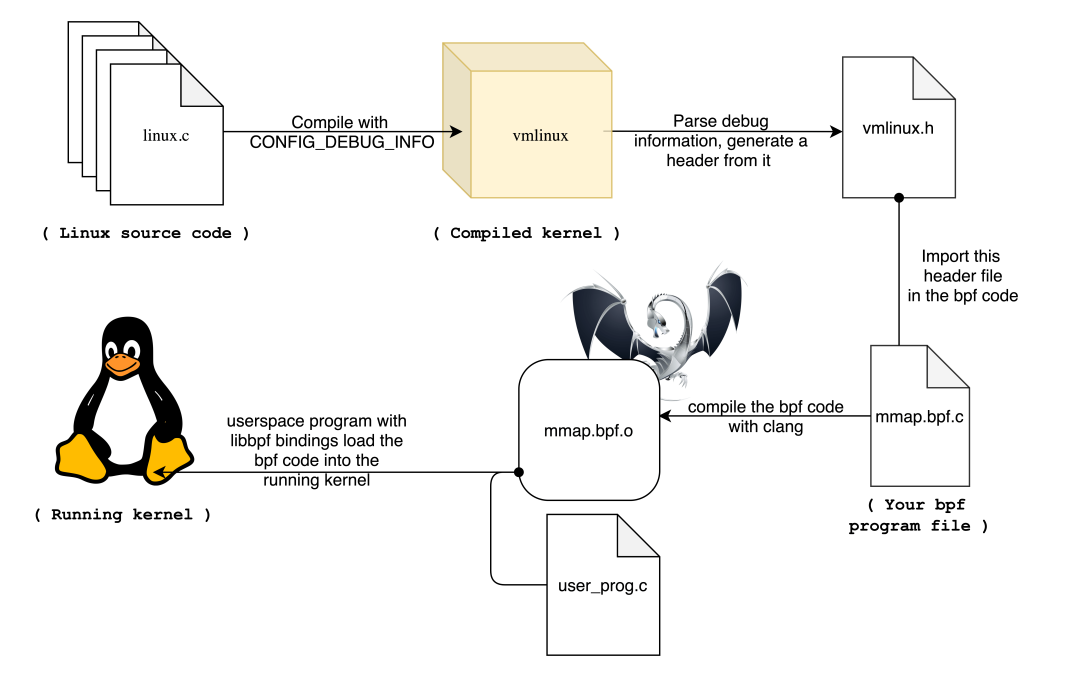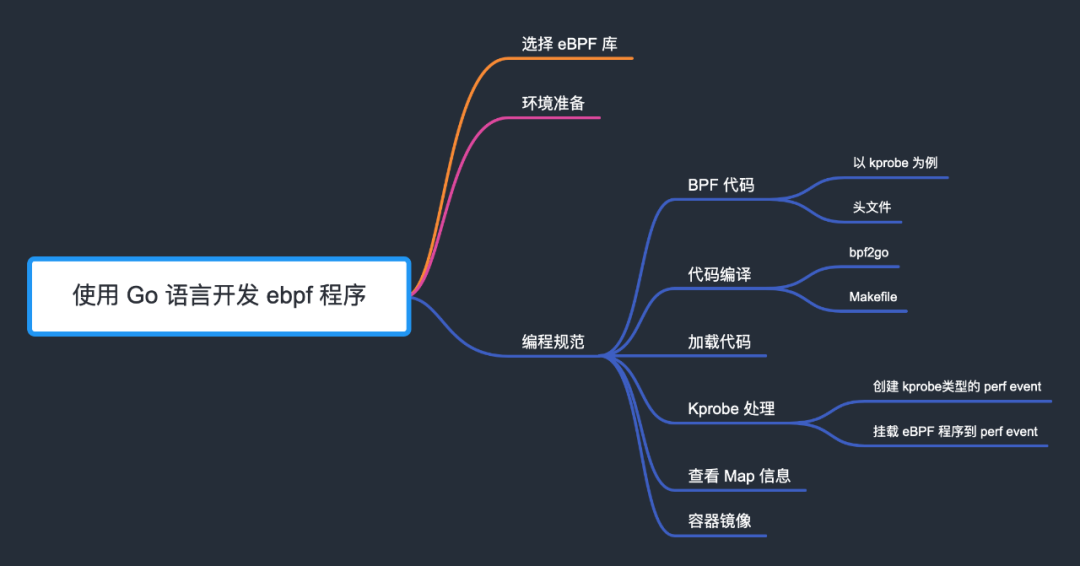使用 Go 语言开发 eBPF 程序转载
在 Introduction to eBPF[1] 这篇文章中介绍了基于内核源码开发并加载 eBPF 代码的过程。本文将介绍基于 Go 和对应的库开发 eBPF 程序,文中所有涉及的代码可以在我的 Github[2] 中找到。
选择 eBPF 库
当涉及到选择库和工具来与 eBPF 进行交互时,会让人有所困惑。在选择时,你必须在基于 Python 的 BCC[3] 框架、基于 C 的 libbpf[4] 和一系列基于 Go 的 Dropbox[5]、Cilium[6]、Aqua[7] 和 Calico[8] 等库中选择。
在大多数情况下,eBPF 库主要协助实现两个功能:
-
将 eBPF 程序和 Map 载入内核并执行 重定位 [9],通过其文件描述符将 eBPF 程序与正确的 Map 进行关联。 -
与 eBPF Map 交互,允许对存储在 Map 中的键/值对进行标准的 CRUD 操作。
部分库也可以帮助你将 eBPF 程序附加到一个特定的钩子[10],尽管对于网络场景下,这可能很容易采用现有的 netlink API 库完成。
当涉及到 eBPF 库的选择时,仍然让人感到困惑。事实是每个库都有各自的范围和限制。
-
Calico [11] 在用 bpftool [12] 和 iproute2 实现的 CLI 命令基础上实现了一个 Go 包装器。 -
Aqua [13] 实现了对 libbpf C 库的 Go 包装器。 -
Dropbox [14] 支持一小部分程序,但有一个非常干净和方便的用户 API。 -
IO Visor 的 gobpf [15] 是 BCC 框架的 Go 语言绑定,它更注重于跟踪和性能分析。 -
Cilium 和 Cloudflare [16] 维护一个 纯 Go 语言编写的库 [17] (以下简称 “libbpf-go”),它将所有 eBPF 系统调用抽象在一个本地 Go 接口后面。
参考 使用 Go 语言管理和分发 ebpf 程序[18] 可以看到 cilium/ebpf 更加活跃,本文也选择基于 cilium/ebpf 库来开发。cilium/ebpf 纯 Go 程序编写,从而实现了程序最小依赖;与此同时其还提供了 bpf2go 工具,可用来将 eBPF 程序编译成 Go 语言中的一部分,使得交付更加方便,后续如果配合 CO-RE 功能则威力大增。
环境准备
eBPF 程序一般有两部分组成:
-
基于 C 语言的 eBPF 程序,最终使用 clang/llvm编译成elf格式的文件,为内核中需要加载的程序; -
Go 语言程序用于加载、调试 eBPF 程序,为用户空间的程序,用于配置或者读取 eBPF 程序生成的数据。
前置条件需要安装 clang/llvm 编译器:
# 安装 llvm 编译器,至少要求 clang 9.0 版本以上
$ sudo apt update -y
$ sudo apt install -y llvm
$ sudo apt install -y clang
可以从我的 Github 下载代码,目录结构如下:
[root@VM-4-27-centos demo]# tree
.
|-- bpf
| |-- headers
| | |-- bpf_core_read.h
| | |-- bpf_helper_defs.h
| | |-- bpf_helpers.h
| | |-- bpf_tracing.h
| | |-- update.sh
| | `-- vmlinux.h
| `-- kprobe.c
|-- Dockerfile
|-- go.mod
|-- go.sum
|-- main.go
`-- Makefile编程规范
BPF 代码
以 kprobe 为例
// +build ignore
char __license[] SEC("license") = "Dual MIT/GPL";
struct bpf_map_def SEC("maps") kprobe_map = {
.type = BPF_MAP_TYPE_ARRAY,
.key_size = sizeof(u32),
.value_size = sizeof(u64),
.max_entries = 1,
};
SEC("kprobe/sys_execve")
int kprobe_execve() {
u32 key = 0;
u64 initval = 1, *valp;
valp = bpf_map_lookup_elem(&kprobe_map, &key);
if (!valp) {
bpf_map_update_elem(&kprobe_map, &key, &initval, BPF_ANY);
return 0;
}
__sync_fetch_and_add(valp, 1);
return 0;
}
头文件
libbpf
# Version of libbpf to fetch headers from
LIBBPF_VERSION=0.5.0
# The headers we want
prefix=libbpf-"$LIBBPF_VERSION"
headers=(
"$prefix"/src/bpf_core_read.h
"$prefix"/src/bpf_helper_defs.h
"$prefix"/src/bpf_helpers.h
"$prefix"/src/bpf_tracing.h
)
# Fetch libbpf release and extract the desired headers
curl -sL "https://github.com/libbpf/libbpf/archive/refs/tags/v${LIBBPF_VERSION}.tar.gz" | \
tar -xz --xform='s#.*/##' "${headers[@]}"
vmlinux.h
vmlinux.h 是使用工具生成的代码文件。它包含了系统运行 Linux 内核源代码中使用的所有类型定义。当我们编译 Linux 内核时,会输出一个称作 vmlinux 的文件组件,其是一个 ELF[19] 的二进制文件,包含了编译好的可启动内核。vmlinux 文件通常也会被打包在主要的 Linux 发行版中。
内核中的 bpftool 工具其中功能之一就是读取 vmlinux 文件并生成对应的 vmlinux.h 头文件。vmlinux.h 会包含运行内核中所使用的每一个类型定义,因此该文件的比较大。
生成 vmlinux.h 文件的命令如下:
$ bpftool btf dump file /sys/kernel/btf/vmlinux format c > vmlinux.h
包含该 vmlinux.h,就意味着我们的程序可以使用内核中使用的所有数据类型定义,因此 BPF 程序在读取相关的内存时,就可以映射成对应的类型结构按照字段进行读取。
例如,Linux 中的 task_struct[20] 结构用于表示进程,如果 BPF 程序需要检查 task_struct 结构的值,那么首先就需要知道该结构的具体类型定义。

由于 vmlinux.h 文件是由当前运行内核生成的,如果你试图将编译好的 eBPF 程序在另一台运行不同内核版本的机器上运行,可能会面临崩溃的窘境。这主要是因为在不同的版本中,对应数据类型的定义可能会在 Linux 源代码中发生变化。
但是,通过使用 libbpf 库提供的功能可以实现 “CO:RE”(一次编译,到处运行)。libbpf 库定义了部分宏(比如 BPF_CORE_READ),其可分析 eBPF 程序试图访问 vmlinux.h 中定义的类型中的哪些字段。如果访问的字段在当前内核定义的结构中发生了移动,宏 / 辅助函数会协助自动找到对应字段。对于可能消失的字段,也提供了对应的辅助函数 bpf_core_field_exists。因此,我们可以使用当前内核中生成的 vmlinux.h 头文件来编译 eBPF 程序,然后在不同的内核上运行它【需要运行的内核也支持 BTF 内核编译选项】。
代码编译
bpf2go
该注解使用 bpf2go 程序将 kprobe.c 文件编译成 bpfdemo_bpfeb.go 和 bpfdemo_bpfel.go 两个文件,分别为 bigendian 和 littleendian 两种平台的程序。
其中参数中的 BPFDemo 参数为 main.go 文件中函数调用的名称,例如 objs := BPFDemoObjects{} 和 LoadBPFDemoObjects(&objs, nil);
// SPDX-License-Identifier: GPL-2.0-only
// Copyright (C) 2021 Authors of Nylon */
//go:generate sh -c "echo Generating for amd64"
//go:generate go run github.com/cilium/ebpf/cmd/bpf2go -cc clang BPFDemo ./bpf/kprobe.c -- -DOUTPUT_SKB -D__TARGET_ARCH_x86 -I./bpf/headers
package main
Makefile
GO := go
GO_BUILD = CGO_ENABLED=0 $(GO) build
GO_GENERATE = $(GO) generate
GO_TAGS ?=
TARGET=BPFDemo
BINDIR ?= /usr/local/bin
VERSION=$(shell git describe --tags --always)
$(TARGET):
$(GO_GENERATE)
$(GO_BUILD) $(if $(GO_TAGS),-tags $(GO_TAGS)) \
-ldflags "-w -s \
-X 'github.com/SimpCosm/godemo/ebpf/BPFDemo.Version=${VERSION}'"
clean:
rm -f $(TARGET)
rm -f bpfdemo_bpf*
rm -rf ./release
执行编译,可以看到生成了对应的 BPF 字节码 bpfdemo_bpfeb.o 和 bpfdemo_bpfel.o,还有对应的 go 文件:
[root@VM-4-27-centos demo]# make
go generate
Generating for amd64
Compiled /root/demo/bpfdemo_bpfel.o
Stripped /root/demo/bpfdemo_bpfel.o
Wrote /root/demo/bpfdemo_bpfel.go
Compiled /root/demo/bpfdemo_bpfeb.o
Stripped /root/demo/bpfdemo_bpfeb.o
Wrote /root/demo/bpfdemo_bpfeb.go
CGO_ENABLED=0 go build \
-ldflags "-w -s \
-X 'github.com/SimpCosm/godemo/ebpf/BPFDemo.Version='"
[root@VM-4-27-centos demo]# ls
Dockerfile bpf bpfdemo_bpfeb.o bpfdemo_bpfel.o go.mod main.go main_arm64.go
Makefile bpfdemo_bpfeb.go bpfdemo_bpfel.go demo go.sum main_amd64.go
加载代码
在我们编写的 Go 代码中,首先需要将编译好的 eBPF 代码加载进内核,调用的是 LoadBPFDemoObjects
// Load pre-compiled programs and maps into the kernel.
objs := BPFDemoObjects{}
if err := LoadBPFDemoObjects(&objs, nil); err != nil {
log.Fatalf("loading objects: %v", err)
}
defer objs.Close()
这里的 LoadBPFDemoObjects 和 BPFDemoObjects 都来自 bpf2go 自动生成的代码。
以 bpfdemo_bpfeb.go 为例,可以看到生成了很多辅助函数和结构体,其中:
-
BPFDemoObjects 包括 BPF 程序和 BPF Map -
LoadBPFDemoObjects 会调用 LoadBPFDemo将编译好的 ELF 格式的 BPF 代码加载进内存,然后调用LoadAndAssign实际调用 BPF 系统调用 load BPF 程序到内核。
// BPFDemoMaps contains all maps after they have been loaded into the kernel.
//
// It can be passed to LoadBPFDemoObjects or ebpf.CollectionSpec.LoadAndAssign.
type BPFDemoMaps struct {
KprobeMap *ebpf.Map `ebpf:"kprobe_map"`
}
// BPFDemoPrograms contains all programs after they have been loaded into the kernel.
//
// It can be passed to LoadBPFDemoObjects or ebpf.CollectionSpec.LoadAndAssign.
type BPFDemoPrograms struct {
KprobeExecve *ebpf.Program `ebpf:"kprobe_execve"`
}
// BPFDemoObjects contains all objects after they have been loaded into the kernel.
//
// It can be passed to LoadBPFDemoObjects or ebpf.CollectionSpec.LoadAndAssign.
type BPFDemoObjects struct {
BPFDemoPrograms
BPFDemoMaps
}
// LoadBPFDemoObjects loads BPFDemo and converts it into a struct.
//
// The following types are suitable as obj argument:
//
// *BPFDemoObjects
// *BPFDemoPrograms
// *BPFDemoMaps
//
// See ebpf.CollectionSpec.LoadAndAssign documentation for details.
func LoadBPFDemoObjects(obj interface{}, opts *ebpf.CollectionOptions) error {
spec, err := LoadBPFDemo()
if err != nil {
return err
}
return spec.LoadAndAssign(obj, opts)
}
实际查看 LoadAndAssign 可以看到它会加载 BPF Program 和 BPF Map 到内核
// LoadAndAssign loads Maps and Programs into the kernel and assigns them
// to a struct.
// struct {
// Foo *ebpf.Program `ebpf:"xdp_foo"`
// Bar *ebpf.Map `ebpf:"bar_map"`
// Ignored int
// }
func (cs *CollectionSpec) LoadAndAssign(to interface{}, opts *CollectionOptions) error {
loader := newCollectionLoader(cs, opts)
defer loader.cleanup()
// Support assigning Programs and Maps, lazy-loading the required objects.
assignedMaps := make(map[string]bool)
getValue := func(typ reflect.Type, name string) (interface{}, error) {
switch typ {
case reflect.TypeOf((*Program)(nil)):
return loader.loadProgram(name)
case reflect.TypeOf((*Map)(nil)):
assignedMaps[name] = true
return loader.loadMap(name)
default:
return nil, fmt.Errorf("unsupported type %s", typ)
}
}
//...
}
这里的 loadProgram 会调用 newProgramWithOptions,处理很多与 BTF 等其他内容后,最终调用 sys.ProgLoad(attr)
func newProgramWithOptions(spec *ProgramSpec, opts ProgramOptions, handles *handleCache) (*Program, error) {
// ...
fd, err := sys.ProgLoad(attr)
// ...
}
此即调用了 BPF 的系统调用:
func ProgLoad(attr *ProgLoadAttr) (*FD, error) {
fd, err := BPF(BPF_PROG_LOAD, unsafe.Pointer(attr), unsafe.Sizeof(*attr))
if err != nil {
return nil, err
}
return NewFD(int(fd))
}
加载 map 也是类似,最终调用了 sys.MapCreate
func MapCreate(attr *MapCreateAttr) (*FD, error) {
fd, err := BPF(BPF_MAP_CREATE, unsafe.Pointer(attr), unsafe.Sizeof(*attr))
if err != nil {
return nil, err
}
return NewFD(int(fd))
}
Kprobe 处理
kprobe 可以对任何内核函数进行插桩,可以实时在生产环境中启用,不需要重启系统,也不需要以特殊方式重启内核。现在有以下三种接口可以访问 kprobes.
-
kprobe API: 如 register_kprobe()等,在 这篇文章中 [21] 介绍了其用法 -
基于 Frace 的,通过 /sys/kernel/debug/tracing/kprobe_events: 通过向这个文件写入字符串,可以配置开启和停止 kprobes,在 这篇文章中 [22] 介绍了其用法 -
perf_event_open(): 与 perf 工具所使用的一样,现在 BPF 跟踪工具也开始使用这些函数
对应到 main.go 中,在 LoadBPFDemoObjects之后,我们还调用了 link.Kprobe 来
// Open a Kprobe at the entry point of the kernel function and attach the
// pre-compiled program. Each time the kernel function enters, the program
// will increment the execution counter by 1. The read loop below polls this
// map value once per second.
kp, err := link.Kprobe(fn, objs.KprobeExecve)
if err != nil {
log.Fatalf("opening kprobe: %s", err)
}
defer kp.Close()
创建 kprobe 类型的 perf event
-
symbol 是追踪的内核函数 -
prog 是编译的 eBPF 程序
func Kprobe(symbol string, prog *ebpf.Program, opts *KprobeOptions) (Link, error) {
k, err := kprobe(symbol, prog, opts, false)
if err != nil {
return nil, err
}
lnk, err := attachPerfEvent(k, prog)
if err != nil {
k.Close()
return nil, err
}
return lnk, nil
}
这里创建了一个 kprobe 类型的 Perf Event,传入的追踪地址是 symbol
// kprobe opens a perf event on the given symbol and attaches prog to it.
// If ret is true, create a kretprobe.
func kprobe(symbol string, prog *ebpf.Program, opts *KprobeOptions, ret bool) (*perfEvent, error) {
// ...
args := probeArgs{
pid: perfAllThreads,
symbol: platformPrefix(symbol),
ret: ret,
}
// Use kprobe PMU if the kernel has it available.
tp, err := pmuKprobe(args)
if err == nil {
return tp, nil
}
// ...
// Use tracefs if kprobe PMU is missing.
args.symbol = platformPrefix(symbol)
tp, err = tracefsKprobe(args)
// ...
return tp, nil
}
最终调用了 PerfEventOpen 来开启一个 perf event,这个系统调用可以参考 这里[23]
// pmuProbe opens a perf event based on a Performance Monitoring Unit.
//
// Requires at least a 4.17 kernel.
// e12f03d7031a "perf/core: Implement the 'perf_kprobe' PMU"
// 33ea4b24277b "perf/core: Implement the 'perf_uprobe' PMU"
//
// Returns ErrNotSupported if the kernel doesn't support perf_[k,u]probe PMU
func pmuProbe(typ probeType, args probeArgs) (*perfEvent, error) {
// ...
switch typ {
case kprobeType:
// Create a pointer to a NUL-terminated string for the kernel.
sp, err = unsafeStringPtr(args.symbol)
attr = unix.PerfEventAttr{
Type: uint32(et), // PMU event type read from sysfs
Ext1: uint64(uintptr(sp)), // Kernel symbol to trace
Config: config, // Retprobe flag
}
case uprobeType:
// ...
}
rawFd, err := unix.PerfEventOpen(&attr, args.pid, 0, -1, unix.PERF_FLAG_FD_CLOEXEC)
fd, err := sys.NewFD(rawFd)
// ...
// Kernel has perf_[k,u]probe PMU available, initialize perf event.
return &perfEvent{
typ: typ.PerfEventType(args.ret),
name: args.symbol,
pmuID: et,
cookie: args.cookie,
fd: fd,
}, nil
}
挂载 eBPF 程序到 perf event
通过 perf_event 的 ioctl 调用把 BPF 程序 attach 到 kprobe event
-
PERF_EVENT_IOC_SET_BPF,表示允许 attach BPF 程序到 kprobe event 上,其中 ioctl 设置的第三个参数代表 bpf 系统调用的 fd。 -
PERF_EVENT_IOC_ENABLE,表示使能 event。
ioctl(perf_event_fd, PERF_EVENT_IOC_SET_BPF, bpf_prog_fd)
ioctl(perf_event_fd, PERF_EVENT_IOC_ENABLE, 0)
attachPerfEvent 通过 perf_event 的 ioctl 调用把 BPF 程序 attach 到 kprobe event
// attach the given eBPF prog to the perf event stored in pe.
// pe must contain a valid perf event fd.
// prog's type must match the program type stored in pe.
func attachPerfEvent(pe *perfEvent, prog *ebpf.Program) (Link, error) {
if prog == nil {
return nil, errors.New("cannot attach a nil program")
}
if prog.FD() < 0 {
return nil, fmt.Errorf("invalid program: %w", sys.ErrClosedFd)
}
switch pe.typ {
case kprobeEvent, kretprobeEvent, uprobeEvent, uretprobeEvent:
if t := prog.Type(); t != ebpf.Kprobe {
return nil, fmt.Errorf("invalid program type (expected %s): %s", ebpf.Kprobe, t)
}
case tracepointEvent:
if t := prog.Type(); t != ebpf.TracePoint {
return nil, fmt.Errorf("invalid program type (expected %s): %s", ebpf.TracePoint, t)
}
default:
return nil, fmt.Errorf("unknown perf event type: %d", pe.typ)
}
if err := haveBPFLinkPerfEvent(); err == nil {
lnk, err := attachPerfEventLink(pe, prog)
if err != nil {
return nil, err
}
return lnk, nil
}
lnk, err := attachPerfEventIoctl(pe, prog)
if err != nil {
return nil, err
}
return lnk, nil
}
通过 ioctl 挂载 BPF 程序:
func attachPerfEventIoctl(pe *perfEvent, prog *ebpf.Program) (*perfEventIoctl, error) {
if pe.cookie != 0 {
return nil, fmt.Errorf("cookies are not supported: %w", ErrNotSupported)
}
// Assign the eBPF program to the perf event.
err := unix.IoctlSetInt(pe.fd.Int(), unix.PERF_EVENT_IOC_SET_BPF, prog.FD())
if err != nil {
return nil, fmt.Errorf("setting perf event bpf program: %w", err)
}
// PERF_EVENT_IOC_ENABLE and _DISABLE ignore their given values.
if err := unix.IoctlSetInt(pe.fd.Int(), unix.PERF_EVENT_IOC_ENABLE, 0); err != nil {
return nil, fmt.Errorf("enable perf event: %s", err)
}
pi := &perfEventIoctl{pe}
// Close the perf event when its reference is lost to avoid leaking system resources.
runtime.SetFinalizer(pi, (*perfEventIoctl).Close)
return pi, nil
}
查看 Map 信息
定期查看 eBPF map 的更新:
// Read loop reporting the total amount of times the kernel
// function was entered, once per second.
ticker := time.NewTicker(1 * time.Second)
log.Println("Waiting for events..")
for range ticker.C {
var value uint64
if err := objs.KprobeMap.Lookup(mapKey, &value); err != nil {
log.Fatalf("reading map: %v", err)
}
log.Printf("%s called %d times\n", fn, value)
}
容器镜像
FROM ubuntu:20.04
RUN apt update -y -q
RUN DEBIAN_FRONTEND=noninteractive apt-get install --no-install-recommends -y -q curl build-essential ca-certificates
RUN curl -s https://storage.googleapis.com/golang/go1.16.3.linux-amd64.tar.gz| tar -v -C /usr/local -xz
ENV PATH $PATH:/usr/local/go/bin
RUN apt install -y wget gnupg2
RUN printf "deb http://apt.llvm.org/xenial/ llvm-toolchain-xenial-12 main" | tee /etc/apt/sources.list.d/llvm-toolchain-xenial-12.list
RUN wget -O - https://apt.llvm.org/llvm-snapshot.gpg.key | apt-key add -
RUN apt -y update
RUN apt install -y llvm clang git
WORKDIR /ebpf
COPY . .
RUN make
RUN chmod a+x /ebpf
ENTRYPOINT ["./ebpf"]
CMD ["./ebpf"]
参考资料
- https://networkop.co.uk/post/2021-03-ebpf-intro/
-
https://www.grant.pizza/blog/vmlinux-header/ -
https://www.ebpf.top/post/ebpf_go_translation/ -
https://tinylab.org/bcc-overview/ -
https://www.brendangregg.com/blog/2021-06-15/bpf-internals.html
引用链接
Github: https://github.com/SimpCosm/godemo/tree/master/ebpf
BCC: https://github.com/iovisor/bcc
libbpf: https://github.com/libbpf/libbpf
Dropbox: https://github.com/dropbox/goebpf
Cilium: https://github.com/cilium/ebpf
Aqua: https://github.com/aquasecurity/tracee/tree/main/libbpfgo
Calico: https://github.com/projectcalico/felix/tree/master/bpf
重定位: https://kinvolk.io/blog/2018/10/exploring-bpf-elf-loaders-at-the-bpf-hackfest/#common-steps
钩子: https://ebpf.io/what-is-ebpf/#hook-overview
Calico: https://pkg.go.dev/github.com/projectcalico/felix@v3.8.9+incompatible/bpf
bpftool: https://twitter.com/qeole/status/1101450782841466880
Aqua: https://github.com/aquasecurity/tracee/tree/main/tracee-ebpf
Dropbox: https://github.com/dropbox/goebpf
gobpf: https://github.com/iovisor/gobpf
Cilium 和 Cloudflare: https://github.com/cilium/ebpf
纯 Go 语言编写的库: https://linuxplumbersconf.org/event/4/contributions/449/attachments/239/529/A_pure_Go_eBPF_library.pdf
使用 Go 语言管理和分发 ebpf 程序: https://www.ebpf.top/post/ebpf_go/
ELF: https://en.wikipedia.org/wiki/Executable_and_Linkable_Format
task_struct: https://elixir.bootlin.com/linux/latest/source/include/linux/sched.h#L649
这篇文章中: https://houmin.cc/posts/c28dc60d/
这篇文章中: https://houmin.cc/posts/3d106760/
这里: https://man7.org/linux/man-pages/man2/perf_event_open.2.html



